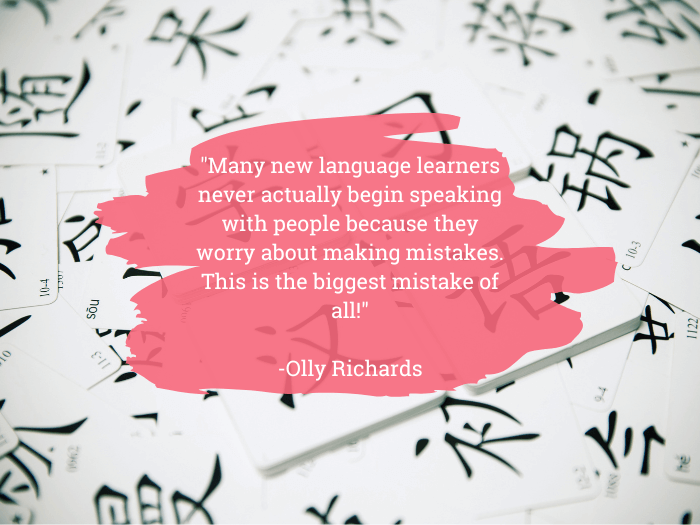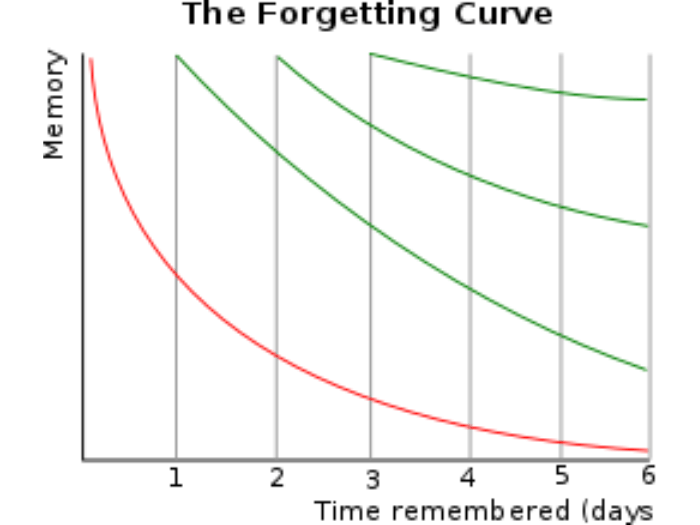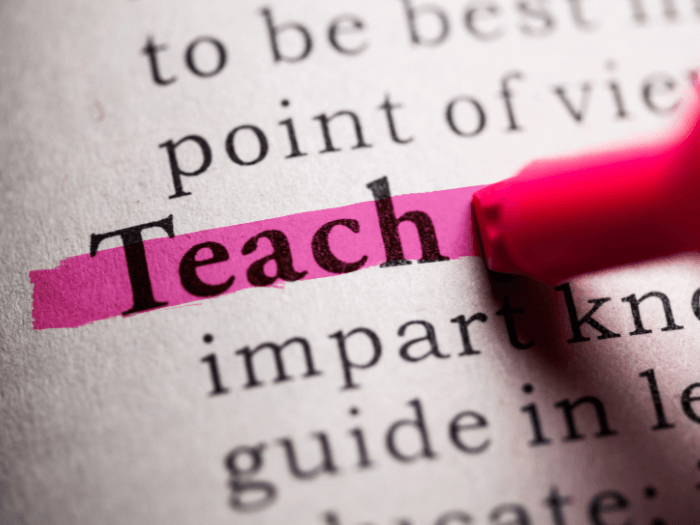There are several errors language learners make when trying to achieve fluency in their chosen language.
The difference between success and failure in language learning for so many people is largely a question of discipline and self-control – dedicating time to the basics everyday even though you're tired after work and it'd be much more fun to go for a beer or stick on a DVD. (It's all about defeating the inconsistency villain!) If you want success in your chosen language, there are a few non-negotiables you need to make part of your study routine.
This article gives you some general language learning tips for learning vocabulary, speaking and reading, as well as how to work with a teacher.
Getting the Basics right
Before you get into the depths of your language study, here are some basic tips for learning a foreign language that many learners often overlook:
- Not setting aside a minimum amount of study time every day
- Not generating momentum through regular, ongoing study
- Getting distracted by tangential Internet junk (should you really be reading this blog right now!?!)
- Not allowing time for the language to develop inside you and becoming impatient
- Not developing a large enough vocabulary to be able to convey basic meaning
- Not seeking out opportunities to speak with native speakers on a regular basis
- Failing to notice the structure of the language and the ways that it's used in practice
- Not giving yourself enough exposure to the language (written or spoken) in order to have the opportunities to notice (reading is perfect for this)
- As ever, none of this is rocket science, nor is it particularly sexy, but it is what will bring you that crucial 80% of gains on an ongoing basis.
Let’s dive into some specific study tips for learning a new language.
Language Learning Tips For New Vocabulary
To get really good at a language you do need to read and listen a lot to authentic language. But you can't do that before you know enough words to understand it all. Therefore, as a beginner, an 80/20 analysis tells you that you need to prioritise one thing: vocabulary.
This leads to five questions:
- How do I choose what vocabulary to learn?
- How do I learn it?
- Won't I get bored if I'm just learning vocabulary?
- Can't I just let it sink in over time and isn't that more natural anyway?
- At what point should I start reading, listening, watch movies etc.?
How Do I Choose What Vocabulary To Learn?
Three places:
- Beginners' resources – whatever you like and fits well into your routine: Teach Yourself/Assimil books, podcast series, online resources.
- A language partner. This is not a teacher or a native speaker friend. It should be someone you sit down and speak with for a period of time, whose job it is to be a sympathetic listener and to offer suggestions for making your speaking more natural. To oversimplify slightly, by constantly asking your language partner “How do I say xyz?”, you will learn a lot of new, highly relevant words and phrases for conversation.
- Your surroundings. If you live in a foreign language environment, you should quickly learn the names of things around you – station/road names, road signs, metro station vocabulary, etc. The reason is that it's high-frequency for you, so by encountering it everyday you will learn it quickly, even if it's “difficult” language.
How Do I Learn The Vocabulary?
Remember that whatever your chosen language learning book/podcast/etc. is, I'm suggesting that you can largely ignore their suggested practice method (“do this exercise now, followed by exercise 4b, then listen to track 34.”), in favour of sitting down and doing whatever it takes to memorise as much of the new vocabulary from the dialogues/texts as possible.
You can use an SRS programme to help you with memorising your chosen vocabulary. In this post, I talk in detail about your options and give you eight great tips for learning vocabulary.
Another fun way to learn new vocabulary is to use Post-it® notes around your home. Here’s how it works:
- Walk around the house and think about the simple, menial things you do every day at home: look in the mirror, brush your teeth, open the door etc.
- Pick a handful of them and write down phrases (in your native language) based on the action that you do. Note: we're not looking for single words here. We need complete phrases with the verb and noun together: mirror look in the mirror. You could stretch it even further by writing a complete sentence: I'm looking in the mirror.
- Translate them into your target language and have the phrases checked by a native speaker or on the website Lang-8.
- Transfer them onto Post-it® notes and stick them in the place that they describe.
- Get on with your life and integrate the language into your routine. Every time you look in the mirror, say the phrase that goes with it.
- When you know them really well, replace the notes with English ones. Then test yourself each time you see it: “How do you say ‘look in the mirror'“?
Won't I Get Bored If I'm Just Learning Vocabulary?
It is a risk, especially if you doggedly plough through one single book. For this reason, I recommend you use a combination of all ideas for the resources mentioned above.
When it comes to actually memorising the vocabulary, having a routine and studying in short bursts makes it more manageable. I do 5-10 minutes of flashcards when I wake up and before bed.
It's sometimes a drag, but it's manageable, which means it's more likely to get done. Don't forget it is possible to do 1 hour's study in only 5 minutes.
Can't I Just Let It Sink In Over Time And Isn't That More Natural Anyway?
Yes, and probably. But how long have you got??? Some people may tell you that children learn in a “natural” way, therefore so should you.
But you have something which children don't: study skills. Use them. I also doubt that you have 16 years (the length of childhood?) to get it together.
At What Point Should I Start Reading, Listening, Watch Movies etc.?
The answer is as soon as possible, but probably not yet!
If you can manage to enjoy reading or listening to things in your new language without understanding, then fantastic. I wish I could – but I can't.
So by all means start reading or watching movies, but treat it as downtime. Don't let that replace your core study time, because you'll get nothing more than broad exposure from it. You need to press ahead with the vocabulary learning.
You will reach a tipping point, where you've got so used to the language and know enough vocabulary that things just start to make sense. That tipping point may take time to come, but trust me, it will come. When it does, that's the time to hit the reading and listening as hard as you can.
Some Objections
Some people might disagree with such a strong focus on vocabulary learning and speaking from the start. Here are some possible objections, together with my responses.
1) You shouldn't speak from the start – it's hard/stressful/damaging/unproductive
Fine. Don't. I do it because I enjoy it, therefore it motivates me. By looking inside yourself you can probably tell whether the idea of speaking early on appeals to you or not. If it doesn't, don't worry. You can wait until you feel ready before you start speaking.
2) Rote learning is old-school
Perhaps, but it works, especially with the marriage of SRS (spaced repetition systems) and modern portable smartphone technology.
3) You need natural language in context to learn a language
Authentic material (newspapers, books etc.) are inappropriate for beginners because the level of challenge is too high. Graded material, such as my short story books, is the best solution in the early stages until you've built up your critical mass of vocabulary.
Tips For Language Learning: Speaking
The quickest way to end any frustration with language learning and get the regular practice you need to start speaking your language well is to go out and find a bunch of speaking partners, teachers, or whoever it may be that you can meet with regularly.
You want to find people who turn up to meet you with the express intention of giving you your vitally important speaking practice… without feeling like you’re taking advantage of a friendship!
The psychological trap is that feeling that it’s logical for your friends to be the ones that you should practice speaking with… because they’re the ones close to you.
“Why does it make sense to go out and find new people?” you think.
But it’s precisely because you need to interact with these people a lot, and regularly, that you need to leave your friendships out of it.
And yes, this means you need to get out of your comfort zone…
Get out there, meet new people…
But it’s easily done these days thanks to websites like ConversationExchange.com or apps like Tandem.
So go out there and make it happen.
Take responsibility for your speaking practice…
And keep going until you get your language level to a point where you can go and hold a genuine conversation with your friends and colleagues, where you can talk about stuff in your new language on an equal footing, without them feeling like they’re just humouring you.
Learning to speak a foreign language takes sustained effort…
So do the right thing, and…take responsibility for your own speaking practice!
When you're face-to-face with someone you meet for the first time, the only thing they're thinking about is whether you seem like a fun or interesting person…or whether you're a little crazy…
Basically, whether they should stop and spend any time talking to you or not! And here's the thing…when people are making those snap decisions about whether you're crazy or not, it's much more about their body language, the look in their eyes, the warmth they convey, and other things like that. Things that have nothing to do with whether you used the right form of the past tense!
But us language learners…what are we thinking about when we speak a foreign language? The big danger is that we're stuck thinking about whether we're speaking accurately or not, making mistakes or not. All this stuff that the person listening couldn't care less about.
Think about it for a second — when was the last time you met someone who wasn't a native English speaker and sat analysing their English as they spoke?
Unless you're a language geek like me… I'd say never. You were thinking much more about whether they seem like a nice person or not.
Obviously, it is desirable to speak a language better, given the choice…But let's not get carried away with accuracy.
The Hidden Advantage Of Being A Beginner

I have often noticed a phenomenon where I’m at my most confident in a new language right at the start, when I only know the basics… maybe after a few weeks of study. It's the “honeymoon period”.
When I don’t know what I don’t know…I’m just thrilled at being able to actually communicate with somebody in a new language.
Often, as I get more advanced in a language, I get more “caught up in my own head”, thinking about grammar and vocabulary and so on. Have you ever had this experience? Of starting out confidently… and then gradually doubting yourself more and more? I think it’s quite likely that you have. It's classic fear villain stuff.
But by far the worst thing to happen is what happens to many new language learners, who never actually begin speaking with people in the first place, because they worry about making mistakes.
You wouldn't believe the number of times people have written to me asking questions like: “But Olly, how can I speak when I don’t know the grammar yet?”
Just remember:
This is nothing more than an intellectual objection!
You don't need correct grammar to communicate, despite what the grammar villain keeps banging on about.
Focus On Communication, Not Language Worries
I learned from my friend Tomas that you don't need to be fluent in a language to communicate effectively. The tools I learned from him have proved to be an incredibly valuable mental tool that I've used throughout my life whenever I find myself worrying about speaking…
- Worrying about my level…
- About making mistakes…
- Or worrying about what they think about my language level…
I cast my mind back to those crazy nights with Tomás where we would meet thousands of people in a night…
Randomly in the queue for a taxi, or an airport lounge…
Or at the top of the Eiffel Tower…
Where we would make friends and bond over the human experience, the place we were, the people around us, the small details that could form the basis of communication…
- The power of looking at somebody in the eye…
- Of smiling…
- Just using a few words in the language and then being open to see what came back and just going with it.
Because here’s the thing: Whatever you’re going through with your language learning, this is something that is happening in your own head.
The worries in your mind – they're intellectual worries, linguistic challenges that bear no resemblance to the reality in front of you.
You’re only thinking about grammar because your teacher set you some homework, or you found it in your textbook.
There’s a dictum in the Jazz world:
“Practise as hard as you can in your own time, so that you can forget it all when you walk onto the stage.”
And this is how I think about language learning…
Forget It All
However hard you’ve been working in the classroom, forget it all when it comes time to speak.
Look into the eyes of the person you’re talking to…
Smile…
And do your best to communicate with them in whichever way your heart tells you.
You have my permission to forget completely your verb tables and your world order, your cases and your particles…
They don’t matter. Crucially, they won’t help you be any more human with the person you're speaking to
As you’re talking, remember that the person in front of you is asking themselves simply whether you’re an interesting person, a good person, an exciting person, someone they should invest in a relationship with…
And you are!
I know you're amazing, because otherwise you wouldn't be reading this!
So don't deprive them of the opportunity to get to know you.
And remember…Nobody cares about your language skills.
Tips For Learning a New Language By Reading

Extensive reading is such a powerful activity, I think. It’s all about the quantity. As you get exposed to more and more information through reading, you develop your global understanding of the language. And your accuracy across the board gradually improves. Of course, you need to review what you read on a regular basis too.
So, which is it?
- Review, review, review?
- Read, read, read?
- Who wins the battle of ideas when it comes to learning foreign languages?
There’s a very simple concept behind the idea “review, review, review”, which is this:
We very rarely learn things first time.
The first time you see a new word, or a new grammar construction, the normal thing to happen is that you completely forget it within 5 minutes.
That’s totally normal, totally fine… and part of the learning experience.
You can see this pattern of “forgetting” visually in the “forgetting curve”, which basically shows that the more times you review something, the longer you remember it.

The original uploader was Icez at English Wikipedia. [Public domain]. The red line shows forgetting without review. The green lines represent review sessions and increased retention.
And so the fundamental principle here is that you need to get plenty of review of the stuff you’re learning, in order to remember it.
Simple, right?
Straightforward…just the way we like it!
So now…
If the higher-order principle is that you need to get lots of review, then the next question is: How do you get that review?
And this is where Krashen and I start to converge…
Because, when I say the word “review”, you might have a certain image come to mind…
You might have an image of sitting down with a notebook or flashcards, looking back over your notes from class… “reviewing your notes”, if you like.
And that’s one way to do it.
But there’s another way to get regular review…Another less obvious way to review stuff…
Drum roll please…
Reading!
That's right.
Reading is also a source of review. Let me explain why.
So…
Built into the act of reading is review.
Review, review, review.
You see something new, you see it again, and you see it again.
As you read, you're learning new things, and then reviewing them.
The most important stuff crops up a lot, and so you review it more.
And guess what…
If you keep it up, you end up knowing that stuff really rather well!
Krashen himself has called learning vocabulary in this way “distributed exposure to vocabulary” …which sounds altogether more convincing.
But I'll stick with the basic concept of “review” right here… because that's exactly what it is!
So, ladies and gentlemen, when Stephen Krashen tells you to read, read, read… he's absolutely right, and you should do exactly what he says!
So How Do You Implement The Read, Read, Read Method?
Now…
You might be wondering…
- What is this crazy “read read read” method?
- Where can I find the instructions and follow this method myself? (Check out the 10 rules of StoryLearning® for a decent primer)
- How is it done?!
Well, I'll let you into a little secret…
This “read read read” method is also the easiest language learning method in the world.
Krashen, who has a knack for giving this stuff fancy names, suggests “Free Voluntary Reading”…
So, it's reading that's not dictated by a course or a teacher, but rather reading that you do out of choice, in free and unstructured time.
And here's some of the “Free Voluntary Reading” that I've done in the last few months…
- The screenplay of Die Hard 4 — in Japanese!
- An eBook called Riconquista il Tuo Tempo — in Italian!
- And the new edition of Short Stories in Spanish by Olly Richards… — in Spanish!
And if you're wondering why I read my own book…
Well, I didn't, I'm just trying to promote it… you'll forgive me, I know.
So let's make this simple…
1) You find a book you like…(here's a few suggestions from yours truly…sorry)
2) You make sure it's not too hard…
3) You read it, enjoy it…
4) And then you do it all over again! (With a new book)
You learn a tonne of new stuff, and have a great time in the process.
So, thanks for reading, and remember…
Do yourself a favour, and Read, Read, Read. Here are some more tips on learning a language by finding new vocabulary in stories.
Tips on Learning a New Language With a Teacher

When you focus on learning a new language, at some point you may want to get the help of a teacher. But what is the job of a teacher?
Let's think about that for a moment:
- Won't we always need a teacher?
- When will we no longer need our teacher?
- Let's take a step even further back and ask: What is a teacher, actually?
For me, a teacher isn't someone who imparts knowledge on you from on high. (Although they might do that too.)
The job of a teacher is to help you, the student, develop the skills to continue to improve by yourself, without relying on a teacher to tell you what to do.
In other words, the teacher's job is to make you a self-sufficient learner.
You never stop learning, and there’s always more to learn…
And it's precisely because there’s always more to learn that, ultimately, you have to be able to do it by yourself.
Here’s some of what you need to be able to do as a student:
- Study by yourself
- Monitor and reflect on your study behaviour
- Identify ways you can improve
- Follow through and act on those ways
Not easy. Not easy at all.
When Norman said:
I will have succeeded as your teacher when you don't need me anymore
…that's what he meant.
His job is to guide you towards being able to learn effectively by yourself, without anyone telling you what to do.
Now, with languages, the challenge is the same:
When you can study by yourself, that’s when you can truly take control of your language learning, drive forward your progress, and even go on to learn multiple languages if you want.
The Problem With Teacher Dependency
The thing is…Far too many people are dependent on their teachers.
I saw this as a teacher myself…
- Students turning up for class week after week, having barely done their homework…
- Or rushing their homework 5 minutes before class…
- Not having listened to a word of English in the week since the last lesson.
It's a mentality of: “I'm paying, so teach me.”
Sorry…it doesn't work like that!
Learning only really happens in your own time, when you're working at it under your own steam, pushing forward with your own goal in mind….
Not when you're sitting in a class being the receiver of knowledge from a teacher.
That's why, for example, in my Uncovered courses, the very first thing you do in each module, before any teaching happens, is read the story by yourself. That's because I want you to get used to working your brain muscles independently.
And so, to bring us to the point of this Rule of Language Learning…
How do you learn how to learn by yourself?
How do you become totally awesome at learning languages by yourself?
Well, you need to do exactly what Norman, my piano teacher, encouraged me to do:
- Study by yourself
- Reflect on how you're studying
- Identify ways you can improve
- Follow through and act on those ways
This is not easy work.
You need to be the inquisitor of your own behaviour, look inwards, with complete honesty and openness, at how you're spending your time when you sit down to study languages.
You need to learn spot patterns in your own study…
What works, what doesn’t.
Why Consistency Is Key In Language Learning
But here’s the thing – you can't spot patterns of any kind when you’re jumping around, doing different things every day!
Quite the opposite!
You need as much consistency as possible in how you study every day in order to spot patterns and improve. That's why the inconsistency villain is particularly dastardly.
In fact, if you're new to language learning, or if you're struggling to figure out how you learn best…
I recommend that you follow the exact same study routine every single day.
To keep things simple, you could pick one activity…
- Reading one chapter from a short story book, such as these ones… (really rather good)
- Completing one chapter from your grammar exercise book
- Writing a diary entry in your target language
It really doesn't matter what the activity is, as long as it's an activity that you believe is helpful.
Then just do it every day.
And keep this up… probably for longer than you're thinking – even a few weeks or more.
Do this consistently, and you'll start to discover little things about yourself and how you learn.
You'll try something new, and it'll work.
So you'll do it again the next day.
And so on.
For example, let's say that your daily routine is to read for 30 minutes in your target language.
Every day, you might try to read in a slightly different way:
- Slower, looking up every word
- Faster, deliberately not looking up new words
- Normally, looking up maximum 3 words per page
- While listening to the audio
Each time you try something like this, you're discovering more about how you learn, and you can take these lessons with you into everything else you do in the future.
But Isn't It Boring To Study The Same Way Every Day?
But Olly! Isn't variety important in language learning? What about creativity and fun?
Yes, variety, creativity and fun are all important. But so is discipline.
So try one approach for a while, and then try the other.
Isn't it boring to study in the same way every day?
Well, it might feel like that at first. But when you start to see how fast you’re learning as a result of all that lovely discipline, I promise you that you’ll forget about any sense of boredom!
Look…becoming an independent, confident language learner is the greatest gift you can ever give yourself…
It really sets you free…
But you do have to work to get there.
So ask yourself: Is sacrificing a bit of variety in the short term a price worth paying to become a better learner?
Discipline in the small things, gives you freedom in the big things.
That's my philosophy, anyway…so, do yourself a favour, use the language learning tips in this post and remember to study the same way every day. Good luck!

Olly Richards
Creator of the StoryLearning® Method
Olly Richards is a renowned polyglot and language learning expert with over 15 years of experience teaching millions through his innovative StoryLearning® method. He is the creator of StoryLearning, one of the world's largest language learning blogs with 500,000+ monthly readers.
Olly has authored 30+ language learning books and courses, including the bestselling "Short Stories" series published by Teach Yourself.
When not developing new teaching methods, Richards practices what he preaches—he speaks 8 languages fluently and continues learning new ones through his own methodology.










































